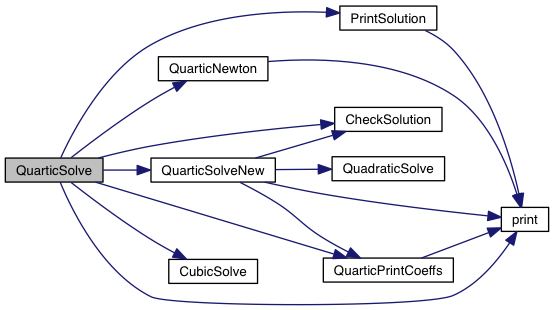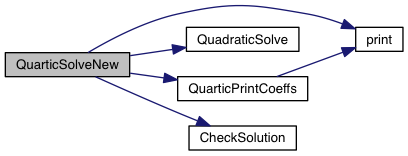|
PLUTO
|
|
PLUTO
|
Solve quartic and cubic equations-. More...
#include "pluto.h"
Go to the source code of this file.
Macros | |
| #define | DEBUG NO |
| #define | swap(x, y) f = x; x = y; y = f; |
| #define | SWAP(x, y) {double _t; _t = x; x = y; y = _t;} |
Functions | |
| void | PrintSolution (double *z) |
| int | QuarticNewton (double b, double c, double d, double e, double *z) |
| void | QuarticPrintCoeffs (double b, double c, double d, double e) |
| double | CheckSolution (double b, double c, double d, double e, double x) |
| double | ResolventCubic (double b, double c, double d, double e, double x) |
| int | QuarticSolveNew (double b, double c, double d, double e, double *z) |
| int | QuadraticSolve (double a, double b, double c, double *x) |
| int | QuarticSolve (double b, double c, double d, double e, double *z) |
| int | CubicSolve (double b, double c, double d, double z[]) |
Variables | |
| static int | debug_print = DEBUG |
| #define DEBUG NO |
Definition at line 13 of file quartic.devel1.c.
| #define swap | ( | x, | |
| y | |||
| ) | f = x; x = y; y = f; |
Definition at line 30 of file quartic.devel1.c.
| #define SWAP | ( | x, | |
| y | |||
| ) | {double _t; _t = x; x = y; y = _t;} |
Definition at line 31 of file quartic.devel1.c.
| double CheckSolution | ( | double | b, |
| double | c, | ||
| double | d, | ||
| double | e, | ||
| double | x | ||
| ) |
| int CubicSolve | ( | double | b, |
| double | c, | ||
| double | d, | ||
| double | z[] | ||
| ) |
Solve a cubic equation in the form
![\[ z^3 + bz^2 + cz + d = 0 \]](form_142.png)
For its purpose, it is assumed that ALL roots are double. This makes things faster.
| [in] | b | coefficient of the cubic |
| [in] | c | coefficient of the cubic |
| [in] | d | coefficient of the cubic |
| [out] | z | vector containing the roots of the cubic. Roots should be sorted in increasing order. |
Reference: http://www.1728.com/cubic2.htm
Definition at line 213 of file quartic.devel1.c.

| void PrintSolution | ( | double * | z | ) |
Definition at line 659 of file quartic.devel1.c.


| int QuadraticSolve | ( | double | a, |
| double | b, | ||
| double | c, | ||
| double * | x | ||
| ) |
Solve a quadratic equation in the form
ax^2 + bx + c = 0
Return roots in increasing order
Definition at line 679 of file quartic.devel1.c.

| int QuarticNewton | ( | double | b, |
| double | c, | ||
| double | d, | ||
| double | e, | ||
| double * | z | ||
| ) |
Solve the quartic equation using Newton method for multiple roots.
Reference
Definition at line 571 of file quartic.devel1.c.


| void QuarticPrintCoeffs | ( | double | b, |
| double | c, | ||
| double | d, | ||
| double | e | ||
| ) |
Definition at line 616 of file quartic.devel1.c.


| int QuarticSolve | ( | double | b, |
| double | c, | ||
| double | d, | ||
| double | e, | ||
| double * | z | ||
| ) |
Solve a quartic equation in the form
![\[ z^4 + bz^3 + cz^2 + dz + e = 0 \]](form_141.png)
For its purpose, it is assumed that ALL roots are double. This makes things faster.
| [in] | b | coefficient of the quartic |
| [in] | c | coefficient of the quartic |
| [in] | d | coefficient of the quartic |
| [in] | e | coefficient of the quartic |
| [out] | z | vector containing the (double) roots of the quartic |
Reference:
http://www.1728.com/quartic2.htm
Definition at line 34 of file quartic.devel1.c.

| int QuarticSolveNew | ( | double | b, |
| double | c, | ||
| double | d, | ||
| double | e, | ||
| double * | z | ||
| ) |
Solve a quartic equation in the form
![\[ z^4 + bz^3 + cz^2 + dz + e = 0 \]](form_141.png)
For its purpose, it is assumed that ALL roots are double. This makes things faster.
| [in] | b | coefficient of the quartic |
| [in] | c | coefficient of the quartic |
| [in] | d | coefficient of the quartic |
| [in] | e | coefficient of the quartic |
| [out] | z | vector containing the (double) roots of the quartic |
Reference:
https://en.wikipedia.org/wiki/Quartic_function
Definition at line 319 of file quartic.devel1.c.


| double ResolventCubic | ( | double | b, |
| double | c, | ||
| double | d, | ||
| double | e, | ||
| double | x | ||
| ) |
|
static |
Definition at line 24 of file quartic.devel1.c.